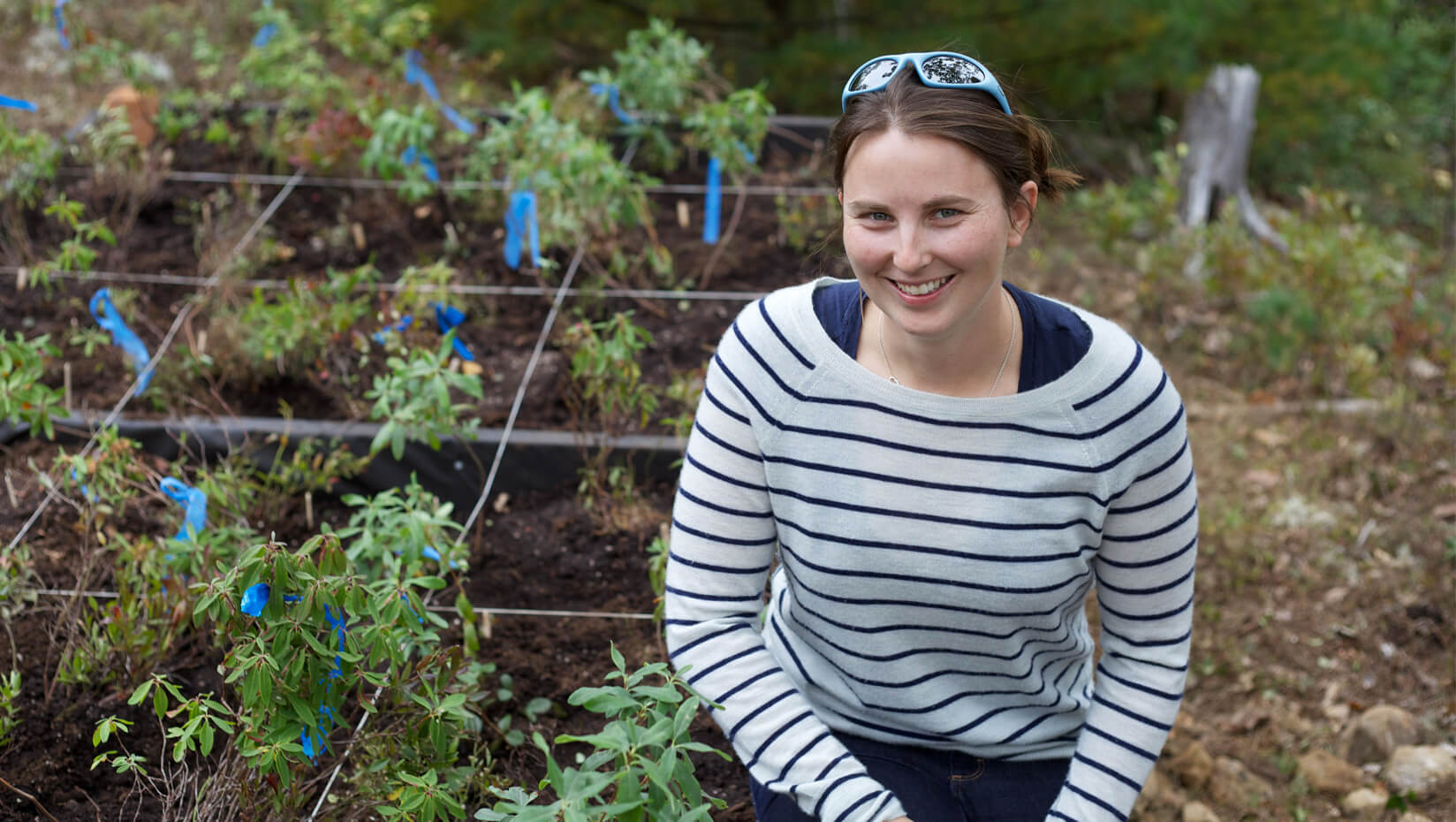
McDonough MacKenzie earns Ecological Society of America’s award for young scientists
The Ecological Society of America named Caitlin McDonough MacKenzie a recipient of the George Mercer Award that recognizes outstanding recently published ecological research by scientists 40 years old and younger.
The postdoctoral fellow at the University of Maine shares the award with Mason Heberling, who is the study’s first author, and with co-authors Jason Fridley, Susan Kalisz and Richard Primack.
Ecology Letters published the study, “Phenological mismatch with trees reduces wildflower carbon budgets,” in February 2019.
“The Mercer Award is such an honor, and I’m so proud to share this with such a wonderful group of collaborators,” says McDonough MacKenzie, a David H. Smith Conservation Research Fellow at the Climate Change Institute.
“This paper sprouted from a side project that started as I was wrapping up my Ph.D. in the Primack Lab and it’s been a lovely excuse to stay in touch with my PI Richard Primack and field sites in Thoreau’s Concord.”
McDonough MacKenzie and Primack presented Henry David Thoreau’s scientific observations to Heberling, the assistant curator of Botany at Carnegie Museum of Natural History. They also presented data of tree and wildflower leaf-out dates measured for 37 separate years as recently as 2018 in Concord, Massachusetts.
“We noticed that the long-term phenology [study of cyclic and seasonal natural phenomena] records in Concord showed leaf out in canopy trees to be more sensitive to climate change than understory wildflowers and wondered about the impact of that mismatch,” says McDonough MacKenzie.
The team compared Thoreau’s observations to photosynthetic data collected in a forest in Fox Chapel, Pennsylvania by Heberling and Kalisz of the University of Tennessee, Knoxville.
Together, the analyses show that small differences in the responses of wildflowers versus trees to a warming climate already could be harming wildflower abundance and flowering, with greater effects in coming years.
“I still can’t believe the serendipity of connecting with Mason, Jason, and Susan as they were studying shade and carbon budgets for understory wildflowers,” says McDonough MacKenzie.
“This collaboration flourished because we were all so excited to find each other. Throughout the project, I was genuinely overwhelmed by my co-authors’ openness, generosity, and support.”
Primarily as a result of human activities, temperatures in Concord, Massachusetts have warmed by 3 degrees Celsius over the past century, the researchers learned.
During the same time period, tree and wildflower leaf-out dates — when plants produce leaves — have shifted significantly.
“Wildflowers are now leafing out about one week earlier than 160 years ago, but the trees are leafing out two weeks earlier,” says McDonough MacKenzie.
“Understory wildflowers need the sunny conditions before the trees leaf out for their energy budgets, but we didn’t know how a shadier spring would affect these plants on the ground.”
As the climate warms, the window of time between wildflower emergence and tree leaf out likely will shorten, leaving wildflowers less time to photosynthesize in the spring.
Climate models predict a 2.5- to 4.5-degree Celsius temperature increase in the northeastern United States by 2080, potentially more than double the temperature increase during the past century.
McDonough MacKenzie says this could result in fewer wildflowers in the future.
“Light is so important for these wildflowers in the early spring, and once the trees leaf out, the light availability drops dramatically,” she says.
“On the one hand, it’s great that trees can track the changing temperatures and leaf out earlier — but, the wildflowers aren’t keeping up and that could mean less energy to produce flowers, fewer seeds and declining wildflower populations.”
McDonough MacKenzie is advised by UMaine paleoecologist Jacquelyn Gill and mentored by Acadia National Park science coordinator Abe Miller-Rushing.
The award ceremony is slated during the ESA’s annual meeting Aug. 2–7 in Salt Lake City. A virtual ceremony and meeting may be held to protect human health due to the pandemic. The theme of the conference: Harnessing the ecological data revolution.
“I loved this paper — I got to explore new ideas about phenological mismatch while collaborating with kind, brilliant scientists,” says McDonough MacKenzie. “The Mercer Award is incredible icing on the cake.”
In its announcement, the ESA wrote that the team showed creative and powerful integration of historical records and contemporary experiments covering many species.
“They tell a convincing and important scientific story with notably clear writing and compelling visuals. The use of historical phenological observations, the oldest of which were made by Henry David Thoreau in the 1850s, alongside long-term temperature records, contemporary garden experiments, and a simulation model is the icing on the cake, extending the timespan of the historical data and providing a ‘hook’ to engage the interest of the media and the general public.”
Founded in 1915, the Ecological Society of America is the world’s largest community of professional ecologists (9,000) committed to advancing the understanding of life on Earth.
The George Mercer Award was established in 1948. Mercer was a promising young ecologist and naturalist killed in World War I.
In Maine, McDonough MacKenzie continues to study the impacts of climate change on plant communities. She is a Second Century Stewardship Fellow at Acadia National Park.
Contact: Beth Staples, beth.staples@maine.edu
